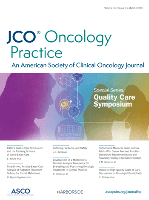
JCO Oncology Practice
Scope & Guideline
Bridging Research and Practice in Oncology Excellence
Introduction
Aims and Scopes
- Clinical Practice Guidelines and Recommendations:
The journal publishes evidence-based clinical guidelines that aim to standardize and improve cancer care practices, ensuring that oncologists have access to the latest recommendations for patient management. - Quality Improvement Initiatives:
Focused on enhancing the quality of care in oncology settings, the journal highlights innovative quality improvement projects that address gaps in care delivery, patient safety, and treatment outcomes. - Health Policy and Economics in Oncology:
Research exploring the economic aspects of cancer care, including cost-effectiveness analyses, financial toxicity, and healthcare policy implications, supporting oncologists in navigating the financial landscape of cancer treatment. - Patient-Centered Care and Communication:
A commitment to improving patient-clinician communication and the overall patient experience, with studies focusing on shared decision-making, patient-reported outcomes, and the psychosocial aspects of cancer care. - Equity and Disparities in Cancer Care:
Addressing health disparities, the journal emphasizes the importance of equitable access to cancer treatment and the need for culturally competent care across diverse populations. - Implementation Science in Oncology:
The journal incorporates research on implementation science to promote the adoption of evidence-based practices in oncology, facilitating the translation of research findings into clinical settings.
Trending and Emerging
- Telehealth and Virtual Care:
The COVID-19 pandemic has accelerated the adoption of telehealth in oncology, with an increasing number of publications exploring its effectiveness, patient satisfaction, and the role it plays in maintaining continuity of care. - Financial Toxicity and Economic Burden:
There is a growing emphasis on understanding financial toxicity associated with cancer treatments, including studies on patient-reported financial distress and interventions designed to alleviate these burdens. - Health Equity and Access to Care:
Research focusing on health disparities and the need for equitable cancer care has gained significant traction, with numerous studies addressing the barriers faced by underserved populations in accessing timely and effective treatment. - Patient-Reported Outcomes and Quality of Life:
There is an emerging trend of incorporating patient-reported outcomes into clinical practice, with studies highlighting their importance in assessing treatment efficacy and improving patient quality of life. - Integration of Technology in Oncology Practice:
The journal is increasingly publishing research on the use of technology, including digital health tools and artificial intelligence, to enhance patient care, streamline clinical workflows, and support decision-making in oncology.
Declining or Waning
- Traditional Chemotherapy Approaches:
There is a noticeable decline in publications focused solely on traditional chemotherapy regimens, as the field increasingly shifts towards targeted therapies and immunotherapies that offer more personalized treatment options. - Single-Institution Studies:
The prevalence of single-institution studies seems to be decreasing, with a growing emphasis on multi-institutional collaborations and larger, more diverse patient populations to enhance the generalizability of findings. - Basic Science Research:
Research that focuses exclusively on basic science or laboratory studies is becoming less common in the journal, as the emphasis shifts towards clinical applications and translational research that directly impacts patient care. - General Oncology Education:
While educational content remains important, there appears to be a decline in general educational articles, with a stronger focus on specialized training and the implementation of new technologies in oncology practice. - Pharmacogenomics and Genetic Testing:
Though still relevant, the frequency of articles strictly dedicated to pharmacogenomics and genetic testing is decreasing, as these topics are increasingly integrated into broader discussions of personalized medicine and treatment strategies.
Similar Journals

JCO Global Oncology
Fostering Collaborative Advancements in OncologyJCO Global Oncology is a premier open-access journal published by Lippincott Williams & Wilkins, dedicated to the dissemination of high-quality research in the fields of cancer research and oncology. Since its inception in 2020, this journal has rapidly established itself as a vital resource for researchers, healthcare professionals, and students, holding a distinguished position in the Q2 category for both Cancer Research and Oncology based on the latest metrics. With an impressive Scopus rank of #61 out of 636 in General Medicine, the journal is recognized for its rigorous peer-reviewed articles and cutting-edge insights into oncological science. The open-access model ensures that vital research is readily available to a global audience, fostering collaborative advancements in the fight against cancer. JCO Global Oncology explores a broad range of topics and encourages submissions that contribute to the understanding, prevention, and treatment of various malignancies. With its substantial impact and ongoing contributions to the field, it stands as a promising platform for advancing oncological discourse and knowledge.

Frontiers in Oncology
Innovating oncology through open access and collaboration.Frontiers in Oncology is a premier open access journal dedicated to advancing the field of oncology through innovative research and knowledge dissemination. Published by FRONTIERS MEDIA SA since 2011, this journal is based in Switzerland and holds an impressive Q2 ranking in both Cancer Research and Oncology as of 2023, highlighting its significance in the academic community. With its commitment to open access, Frontiers in Oncology ensures that vital research is readily available to researchers, healthcare professionals, and students around the globe, enhancing collaboration and fostering breakthroughs in cancer research. The journal's robust Scopus rankings further illustrate its academic influence, with notable positions in the fields of Oncology and Cancer Research. By covering a wide range of topics within oncology, this journal serves as a vital resource, supporting the rapid evolution of cancer treatment, diagnostics, and patient care strategies.
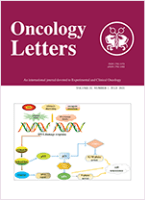
Oncology Letters
Empowering Oncology with Groundbreaking DiscoveriesOncology Letters is a prominent academic journal dedicated to disseminating high-quality research in the fields of oncology and cancer research. Published by SPANDIDOS PUBL LTD and based in Greece, this journal has established a significant presence since its inception in 2010 and continues to contribute to the scientific community with a focus on both clinical and experimental oncology. Notably, it holds a respectable Q3 ranking in the categories of Cancer Research and Oncology as of 2023, highlighting its relevance and contribution to these critical fields. With a Scopus rank of #139/404 in Medicine – Oncology and #117/230 in Biochemistry, Genetics, and Molecular Biology – Cancer Research, Oncology Letters serves as a valuable platform for researchers, professionals, and students alike to explore emerging findings and innovative treatment approaches. Though it operates within a traditional subscription model, this journal prides itself on fostering accessible and impactful discourse in oncology, making it an essential resource for those committed to advancing cancer research and improving patient care.
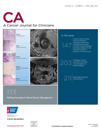
CA-A CANCER JOURNAL FOR CLINICIANS
Empowering Clinicians with Cutting-Edge Oncology ResearchCA: A Cancer Journal for Clinicians is a prestigious academic journal published by Wiley, serving as a leading source of evidence-based information for those in the fields of oncology and hematology. With an impressive impact factor and ranked in the top quartile (Q1) for both specialties, this journal aims to bridge the gap between the latest research findings and clinical practice. Established in 1950, it boasts a long-standing history of delivering essential insights, guidelines, and innovative strategies to healthcare professionals worldwide, making significant contributions to the understanding and treatment of cancer. Although it does not offer open access, its published content is crucial for researchers, clinicians, and students dedicated to advancing cancer care. The journal's commitment to excellence is reflected in its elite rankings, holding the #1 position in both the Medicine – Oncology and Medicine – Hematology categories according to Scopus, positioning it in the 99th percentile of scholarly impact.
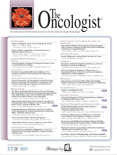
ONCOLOGIST
Empowering discoveries in oncology and beyond.ONCOLOGIST is a premier, open-access journal published by Oxford University Press, advancing the field of cancer research since its inception in 1996. With an impressive H-Index and a prestigious placement within the Q1 category in Cancer Research, Medicine, and Oncology for 2023, ONCOLOGIST stands at the forefront of oncological science, boasting a Scopus rank of #55 out of 404 in Medicine and #47 out of 230 in Cancer Research. This journal not only disseminates cutting-edge research but also aims to foster multidisciplinary approaches that are critical for addressing the complex challenges faced in cancer therapy and survivorship. Be part of a vibrant community as you explore impactful research articles that contribute to the global conversation on cancer. ONCOLOGIST is dedicated to providing an accessible platform for authors and readers alike, ensuring that high-quality research is available to all stakeholders in the fight against cancer.

Current Oncology
Unlocking Knowledge, Transforming OncologyCurrent Oncology is a prominent open-access journal dedicated to the field of oncology, published by MDPI in Switzerland. With an ISSN of 1198-0052 and E-ISSN 1718-7729, this esteemed journal has been providing valuable insights since its inception in 1998 and continues to publish cutting-edge research through 2024. Recognized for its contribution to the medical community, Current Oncology holds a 2023 Q2 category rank in Oncology and is positioned at the 41st percentile among its peers in Scopus rankings. As a hub for innovation and discussion in cancer research, it offers a plethora of articles that span various aspects of oncology, making it an essential resource for researchers, professionals, and students alike. Since becoming fully open-access in 2006, it provides expanded accessibility to groundbreaking studies and findings, fostering collaboration and knowledge exchange across the global research community. With its central location in Basel, Switzerland, Current Oncology plays a pivotal role in advancing oncology's frontiers.
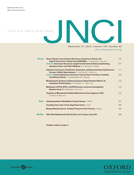
JNCI-Journal of the National Cancer Institute
Elevating the standards of cancer care through scholarly work.JNCI-Journal of the National Cancer Institute, published by Oxford University Press Inc. in the United Kingdom, is a premier journal dedicated to advancing the field of cancer research and oncology. With a distinguished history dating back to 1940, this journal has consistently maintained a strong reputation within the academic community, achieving a remarkable Q1 ranking in both Cancer Research and Oncology as of 2023. Researchers and practitioners rely on the JNCI for original research articles, review papers, and cutting-edge findings that impact clinical practices and therapeutic strategies. Although it does not currently offer open access, the journal remains a vital resource for academicians and healthcare professionals seeking to enhance their understanding of cancer mechanisms and treatment innovations. Its rigorous peer-review process ensures the publication of high-quality, credible research that meets the evolving challenges of cancer treatment and prevention through to 2024.

JNCI Cancer Spectrum
Unlocking the future of cancer research and treatment.JNCI Cancer Spectrum, published by Oxford University Press, is a leading open-access journal dedicated to advancing the field of cancer research and oncology. With an impressive impact demonstrated through its Q1 ranking in both Cancer Research and Oncology categories for 2023, this journal provides a vital platform for disseminating high-quality research and innovative findings in a rapidly evolving landscape. Since its inception in 2017, JNCI Cancer Spectrum has embraced open access, enhancing the accessibility of evidence-based knowledge to researchers, professionals, and students across the globe. Additionally, it boasts notable positions in Scopus rankings, with a strong performance in both the Medicine and Biochemistry, Genetics and Molecular Biology categories. The journal is committed to its objectives of fostering collaborative efforts and encouraging dialogue among experts, making it an essential resource for anyone involved in cancer research.
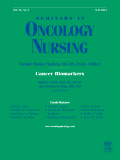
Seminars in Oncology Nursing
Advancing Oncology Nursing Through Knowledge and InnovationSeminars in Oncology Nursing, published by Elsevier Science Inc, serves as a cornerstone for the field of oncology nursing, facilitating the dissemination of high-quality research and clinical practice insights since 1985. This quarterly journal, with significant impact as reflected in its Q2 ranking in the Nursing category for Oncology, provides an essential platform for the authors to share their findings, experiences, and innovations that can enhance patient care in oncology settings. With its ISSN 0749-2081 and E-ISSN 1878-3449, the journal offers a comprehensive access to a wealth of articles that emphasize evidence-based practices, care models, and the evolving challenges faced by oncology nurses. Targeted towards researchers, clinicians, and students, Seminars in Oncology Nursing not only contributes to academic discourse but also supports the professional development of its readership, ultimately advancing the field of oncology nursing.
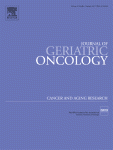
Journal of Geriatric Oncology
Championing the unique needs of geriatric oncology.Journal of Geriatric Oncology, published by Elsevier, stands at the intersection of geriatric medicine and oncology, addressing the unique needs and challenges of cancer management in older adults. Since its inception in 2010, this esteemed journal has played a pivotal role in advancing research and clinical practices, aiming to improve the quality of life and treatment outcomes for elderly cancer patients. With its impressive categorization in the 2023 Q2 quartile for both Geriatrics and Gerontology and Oncology, the journal demonstrates a noteworthy impact within its fields, ranking #153 out of 404 in Medicine – Oncology and #45 out of 116 in Medicine – Geriatrics and Gerontology. Researchers and healthcare professionals are encouraged to access critical insights through its rigorous peer-reviewed articles, which offer cutting-edge research findings and clinical applications. As the field continues to evolve, the Journal of Geriatric Oncology remains a vital resource for those dedicated to fostering innovation in geriatric oncology.